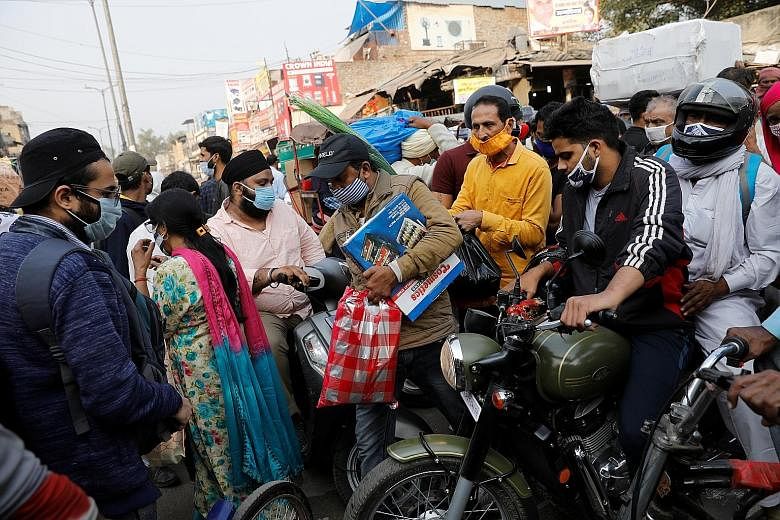Coronavirus cases have been on a downward trend in India, but the capital city of Delhi is seeing a third wave of the pandemic.
The city on Wednesday recorded a new high of 8,593 new cases, up from around 2,000 cases a day in September.
On Thursday, it recorded 7,053 new cases and 104 deaths, the highest number of deaths in a day.
The Delhi High Court warned that the city could become the Covid-19 capital of the country even as reports are emerging of fast-filling hospital beds.
The court on Thursday allowed the government to reserve 80 per cent of the intensive care unit beds in 33 private hospitals for Covid-19 patients, even as half of the city's 16,614 beds reserved for them are now occupied.
Of 1,328 ICU beds with ventilators, 1,156 are taken.
Delhi Chief Minister Arvind Kejriwal maintained that the situation would improve in seven to 10 days but did not offer any reasons.
India, which had a stringent lockdown, remains the second most affected country after the United States.
Still, the overall number of cases has fallen.
On Thursday, 44,879 new cases were recorded, compared with over 80,000 a day in early September.
The national recovery rate is 92.97 per cent, based on government data.
The fall in cases is seen to be coming from states like Maharashtra.
But Delhi, which has a population of more than 19.8 million, has struggled to control the pandemic.
It has a total of 467,000 cases and a death toll of 7,332.
Professor K. Srinath Reddy, president of the Public Health Foundation of India, said: "Delhi has historically been destroyed and rebuilt seven times...
"It also seems destined to be invaded by Covid-19 many times.
"It is now going through the third cycle of rise and fall in the case counts since February.
"Every time the restraints are relaxed, there is a tendency to crowd in the markets."
He added that the festive season last month and this month coincides with the advent of winter and a rise in air pollution levels.
"Together with the super-spreader events fuelled by shopping sprees for festive discounts, these factors give the virus a huge scope for spread," he said.
The city's Covid-19 troubles have intensified due to the annual spike in pollution during winter, brought on by stubble burning to clear farmland in neighbouring states.
This, exacerbated by vehicular and industrial pollution, takes the air quality index into the very poor category.
The Indian Medical Association has warned that one in eight Covid-19 cases could be linked to pollution, which studies have shown raises the risks of infection.
It said: "Increased air pollution leads to increased inflammatory response, and 13 per cent of the increase (in Covid-19 cases) has been estimated to be due to pollution."
A study published in the Cardiovascular Research journal said long-term exposure to air pollution could be linked to 15 per cent of Covid-19 deaths globally.
A Harvard study recently found that someone living in an area of high-particulate pollution is 8 per cent more likely to die from Covid-19 than others in areas with less pollution.
Across Delhi, the lead-up to Deepavali has seen crowds in markets.
Dr Sandeep Sharma, a doctor in South Delhi, said people were no longer scared of the coronavirus.
"I feel that the fear factor is probably gone. Now people are taking it lightly. They know the coronavirus is there to stay and they have to live with it. The restrictions are gone, so people are meeting and partying," said Dr Sharma.
"And that is the reason we are getting more and more patients."
Health experts warned of a festive surge in other parts of North India.
Prof Reddy said: "Overall, India has been maintaining a steady decline in the rates of Covid-19 cases and deaths since September.
"However, North India faces the danger of a severe winter, high air pollution levels and long festive seasons, which spur crowded celebrations and frenzied shopping in urban areas."
He added: "The danger of a fresh virus surge has to be contained through strong public health measures which call for resolute regulatory measures and individual measures for personal protection.
"The virus must not be permitted to dominate our lives when the calendar changes to 2021."











